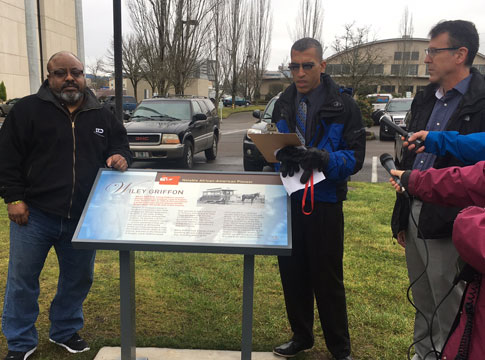Related News
Related News
-
EWEB Board of Commissioners Approves Employment Agreement with John Hairston as Next General Manager
“EWEB is a public treasure,” Hairston said. “I’m eager to listen to staff, learn from the community, and build on the strong foundation already in place."
Find Out More -
EWEB Board of Commissioners selects BPA administrator for general manager role
In a unanimous vote, EWEB’s Board voted to move forward with negotiating an employment offer to BPA’s John Hairston.
Find Out More -
EWEB Board adopts 2026 organizational goals to guide utility priorities
At the January public meeting, EWEB adopted a new set of organizational goals for 2026, providing direction for our work priorities in the year ahead.
Find Out More -
Our Favorite Photos of 2025
For a final look-back at 2025, we’d like to share some of our favorite photos that illustrate our work day-in and day-out. We celebrate amazing teamwork, vital partnerships, and sing the praises of our individual champions and their quiet dedication to serving our community!
Find Out More -
EWEB and the UO launch energy generation pilot project
Pilot project gives EWEB the option to run UO’s on-site natural gas generator this winter, gathering valuable insight into the generator’s efficiency and reliability.
Find Out More -
Sustainability Snapshot - Celebrating Energy Efficiency Projects in the Community
Sustainability Snapshops highlight impactful projects completed by EWEB's Customer Solutions department, as a way to celebrate the meaningful work happening behind the scenes.
Find Out More -
McKenzie Valley electric service territory realignment study reaches key milestone
EWEB Commissioners approved a resolution authorizing the General Manager to negotiate and execute agreements with Lane Electric Cooperative regarding a potential realignment of electric service territory in the McKenzie Valley at the Board’s December meeting.
Find Out More -
Women in STEM: Meet the Hydro Project Engineer Building Habitat for Salmon
EWEB Engineer Associate Val Chang found her way to the McKenzie River from Los Angeles, inspired by heritage trips to the waters of Taiwan and key mentors along the way.
Find Out More -
Public Power Week Poster Contest Winners 2025
The results are in! View the winning posters from EWEB's 2025 Public Power Week Poster Contest.
Find Out More -
EWEB Hometown Heroes compete internationally
Out of 290 teams from 14 different countries, EWEB's Lineman Rodeo team places in the top third of competitors.
Find Out More -
EWEB's Halloween Truck-or-Treat is a huge success
Community members are accustomed to spotting EWEB trucks around Eugene streets and neighborhoods. But last week, those familiar vehicles looked a little different. At EWEB's second annual Truck-or-Treat Customer and Crew Appreciation Event, our fleet transformed into a festive Halloween spectacle.
Find Out More -
Let's Talk Turkey. Is your family ready for winter?
We're heading into the holidays, but that also means snow, ice, and not-so-nice weather might be in the forecast. Here are some tips to prepare in advance.
Find Out More -
Vote for your favorite Public Power Week Posters
The top five submittals will receive awards. Help us pick the winners.
Find Out More -
EWEB Hosts Annual Spill Drill to Protect McKenzie River
EWEB led emergency responders in its annual “spill drill” on the McKenzie River on Wednesday, Oct. 15, at the Trail Bridge Campground.
Find Out More -
Electric Projects underway in North & South Eugene
Underground lines and disaster-resilient power poles are part of EWEB’s infrastructure upgrade near Eugene’s largest natural resource area.
Find Out More - Show More
EWEB Dedicates Historic Marker to Wiley Griffon, an Early African-American Pioneer
March 14, 2017

Wiley Griffon, among Eugene's earliest African-American residents, came to Oregon from Texas in 1891. In 1909, he purchased a small home on riverfront property near what is now East 4th Ave. and Mill St. in Eugene, immediately west of our headquarters building.
Despite an exclusion clause in Oregon's constitution that made it illegal for African-Americans to settle in the state, Wiley Griffon was a well-known and popular resident.
He became a driver for Eugene's first streetcar system - a mule-powered trolley car that rumbled up Willamette Street, carrying passengers from the Southern Pacific depot to 11th Ave., and east to the University of Oregon. Local children saved their pennies to buy a nickel ride on Griffon's trolley, and he often rewarded them with an easy smile, hard candy, stories and an occasional free ride home. The mule car line never thrived, and by the turn of the century it died out entirely.
Griffon took a series of jobs following the end of the trolley line, including janitor at the university dorm, restaurant worker, and waiter on a railroad dining car. At the time of his death in 1913, at age 46, Griffon was working as a porter at the Elks Club. The location of his grave in Eugene's Masonic cemetery, and the fact that the Elks Club paid for his funeral, indicate the great respect this African-American pioneer earned during his 22 years in a nearly all-white community.
To commemorate Griffon's home site and recognize the community respect he earned, we partnered with the Lane County branch of the National Association for the Advancement of Colored People to celebrate one of the city's first African-American residents to develop a historical marker.
"I'm really excited to move this story from oral tradition into a confirmed solid history for our community," said Eric Richardson, president of the local branch of the NAACP. "It's important to remember to look back at where we've been and how things have changed so we can continue to move the ball forward."
The dedication of the sign took place on Feb. 17, 2017, during Black History Month. The sign, photos and text are the result of the contributions of numerous community members and organizations, including the Lane County Historical Museum.

